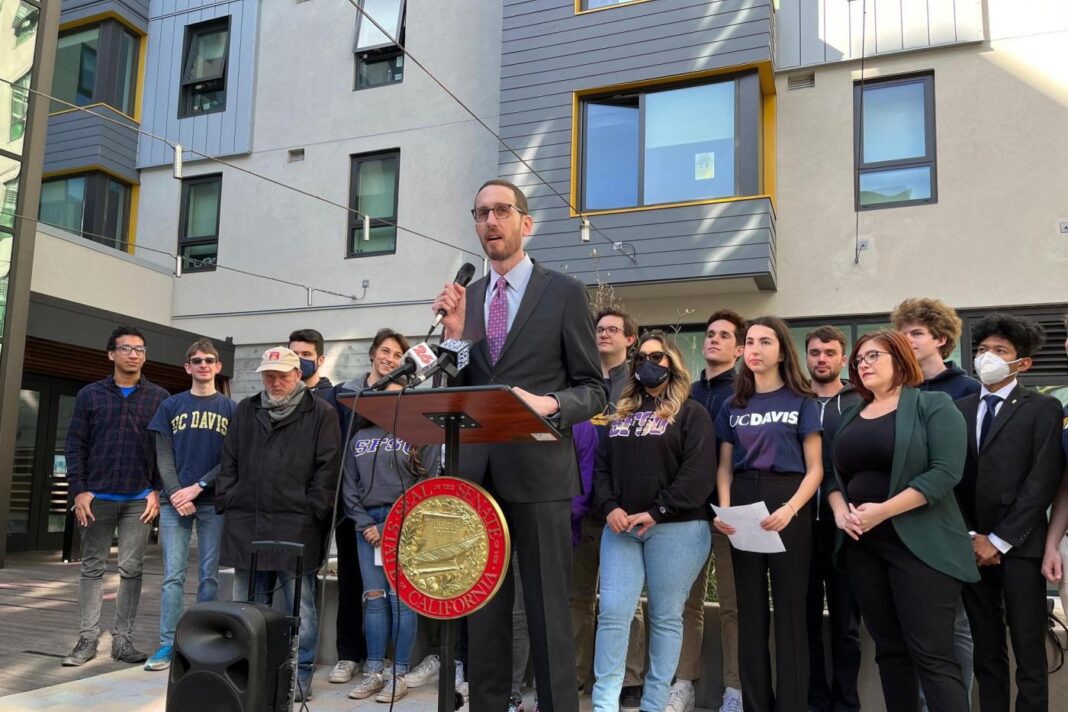The California State Legislature on Monday passed two bills intended to streamline housing permitting, despite opposition from some communities arguing the bills will strip them of local control. The first, Senate Bill 423, would extend a 2017 state housing law set to expire in 2026 that allows developers to bypass certain parts of the permitting process in cities that are behind on meeting state-mandated housing goals. While the existing law only applies to subsidized affordable housing, SB 423 allows developers of mixed-income multifamily housing to take advantage of the streamlined process, too.
A second bill, Senate Bill 4, would allow religious institutions and nonprofit colleges to build affordable housing on their land, even if local zoning prevents it. “Enacting SB 4 and 423 will add powerful tools to our arsenal in combating the housing crisis,” said Sen. Scott Wiener, the bills’ sponsor, in a statement.
Proponents — including the California Housing Consortium and California YIMBY (short for “Yes in My Backyard”) expect it to build upon the success of the 2017 housing bill, SB 35, which has led to more than 18,000 proposed new units across California, according to a recent study by the UC Berkeley Terner Center for Housing Innovation. Still, California is far from hitting its goal of in the next eight years. “SB 35 has done more to build affordable housing in California than any other state law or local measure,” said Brian Hanlon, CEO of California YIMBY, in a statement.
“With the passage of SB 423, we have the chance to double down on this successful legislation and build more homes affordable to people at all income levels. ” But several California cities opposed SB 423, arguing that it takes away their ability to regulate housing. The League of California Cities, which lobbies at the statehouse on behalf of local governments, said it was concerned about a provision in the law that would allow the state to control housing developments or land that they own or lease, without following local zoning or development standards.
“This measure would double down on a recent trend of the state forcing cities to approve certain housing projects without regard to the needs of the community, opportunities for environmental review, or public input,” their lobbyist, Jason Rhine, said in a statement. “We cannot streamline our way out of this housing crisis. ” Some environmental groups also took issue with the bill at first, arguing it would fast-track apartment development in coastal areas exempted from the original law.
Over the summer, the California Coastal Commission argued that SB 423 would accelerate the construction of luxury, ocean-front condominiums rather than generate affordable housing. They later adopted a “neutral” stance after Wiener accepted amendments clarifying that the law would not apply to “environmentally sensitive or hazardous” areas, like those vulnerable to sea-level rise. The law split support among California’s influential labor unions.
The State Building and Construction Trades Council of California opposed the bill’s lack of protections for workers. Under the law, 100% affordable developments must pay construction workers union-level wages, but they aren’t necessarily obligated to hire union workers. But the California Conference of Carpenters, which began allying with , went against the Trades Council to sponsor SB 423, arguing that creating more high-paying construction jobs took priority over guaranteed union jobs.
“The mission of the Carpenter’s Union… is to build the houses that California desperately needs while making sure all construction workers are provided family supporting wages and benefits,” said Ron Rowlett, director of government affairs with the Nor Cal Carpenters Union. Similar dynamics were at play in SB 4, Sen. Wiener’s third attempt at making it easier for churches to build housing.
Part of a broader “Yes in God’s Backyard” movement, the bill was sponsored by several housing associations and faith groups, including the Non-Profit Housing Association of Northern California and the Jewish Public Affairs Committee of California. Related Articles “This is something that is deeply synonymous with our Jewish values of loving the stranger and caring for our neighbor,” said JPAC California Executive Director David Bocarsly. “Creating a process where it’s easier for synagogues and other faith institutions to support affordable housing and the folks who would benefit from it is a critical way to allow Jewish institutions and other faith institutions to live into their values, and address one of the most critical issues in California today.
” A found that the bill could unlock nearly 40,000 acres for development. The bills now head to Gov. Gavin Newsom, who must sign or veto them before Oct.
14. His office did not immediately respond to a request for comment, but the governor has become more aggressive recently about cracking down on municipalities that aren’t complying with state housing laws. .
From: eastbaytimes
URL: https://www.eastbaytimes.com/2023/09/12/california-legislature-passes-bills-removing-roadblocks-for-new-housing/



